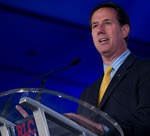
Surging Republican presidential candidate Rick Santorum, a longtime critic of public education, said at a recent campaign stop that President Obama has “waged war” against for-profit colleges that could serve as job-training centers in the recovering economy.
Santorum, a former Pennsylvania senator who has vaulted to the top of the Republican primary polls in recent weeks, outlined a plan for for-profit schools – many with vast online programs for nontraditional students – if he were to win the presidency.
Santorum’s advocacy for companies that operate for-profit schools comes just weeks after former Massachusetts Gov. Mitt Romney presented Orlando-based for-profit campus Full Sail University as a model for how higher education should operate.
Read more about for-profit colleges in higher education…
Romney’s support for Full Sail University raises eyebrows in higher education
Kaplan University: Preying on ‘pain’ and ‘fears’ of low-income students is not ‘remotely deceptive’
At a campaign event at the Detroit Economic Club ahead of the GOP’s March 1 Michigan primary, Santorum criticized Obama for pushing regulations on the for-profit education industry even after national statistics showed skyrocketing dropout and loan default rates at those schools.
“And what we’ve seen in this president is an assault on those very schools that do most of the training out there, and that’s the private schools,” he said. “This president has had a war on private education. … He believes that private sector schools are somehow evil and they’re abusive, and his Education Department has done everything they could to make it harder for them to compete for loans and other things and to stay in business.”
Santorum said he would ensure for-profit colleges are “funded like any other school” and become hubs for training workers who require further education to qualify for open jobs.
David Halperin, a senior fellow for United Republic, a site that tracks how money is used in national politics, said Santorum has made it clear that he will compete for the support of for-profit college executives that have, so far, coalesced behind Romney.
Santorum “appears ready to compete on yet another plane [with Romney],” Halperin wrote in a blog post for Republic Report. “Call it the For-Profit College Primary, with no delegates but lots of campaign cash up for grabs.”
Santorum, whose children attended a private online charter school in Pennsylvania, is no stranger when it comes to skepticism of public higher education. In an August 2008 speech to students at Ave Maria University, a private Catholic university in Florida, Santorum charged that the “root” of America’s moral failings stems from the corruption of higher education.
“The place where [Satan] was the most successful and the first successful was in academia,” he said. “He understood the pride of smart people. He attacked them at their weakest [and said] that they were in fact smarter than everybody else. … Academia, a long time ago, fell.”
Santorum said “the corruption of culture” in America could be traced to the country’s most prestigious campuses.
“What academia does is educate the elites in our society,” he said. “And they were the first to fall. … We saw this domino effect.”
Federal regulations known as “gainful employment” rules pit the Obama administration in a nearly three-year fight with lobbyists for the for-profit college industry. Officials from the private education sector argued that their colleges served many low-income students who were more likely to default on massive school loans.
The political battle waged between the White House and the for-profit sector set the stage for a prominent role for the industry in the 2012 election.
Romney has mentioned the 15,000-student Full Sail by name several times on the campaign trail during the fall and winter, saying the university was able to “hold down the cost of education” and serve as an example of how competition can improve higher education.
Twelve percent of students attend for-profit institutions, but the industry is responsible for about 45 percent of the nation’s student loan debt, according to federal statistics.
Romney’s high esteem for Full Sail also coincides with campaign contributions from the university’s CEO, Bill Heavener, who gave the maximum $2,500 to Romney’s campaign and another $45,000 to a so-called “super PAC” that supports Romney for president and is run by aides to the former governor, as first reported by the New York Times.
Full Sail’s video game arts program, for instance, saw 14 percent of its students graduate last year. A degree in video game arts would cost $81,000. While other Full Sail programs have higher completion rates, all of its programs are many times more expensive than nonprofit and public universities.
Dissatisfaction with Full Sail sparked a website called Full Sail Review, which seeks to advise prospective students before they commit to attending the for-profit university.
The site rails against the school for deceptive recruitment practices and the poor quality of Full Sail’s online course selection, among other complaints.
- Research: Social media has negative impact on academic performance - April 2, 2020
- Number 1: Social media has negative impact on academic performance - December 31, 2014
- 6 reasons campus networks must change - September 30, 2014